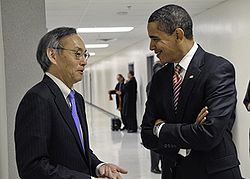Steven Chu
Steven Chu (February 28, 1948), American scientist who, along with Claude Cohen-Tannoudji and William Daniel Phillips, received the Nobel Prize in Physics in 1997 for their independent and pioneering work in the field of physics. cooling and trapping of atoms using laser light.
Biography
Chu graduated from the University of Rochester, New York, in 1970 with a B.S. in physics and an A.B. in math. He earned his Ph.D. in Physics in 1976, at the University of California, Berkeley, where he was a "postdoctoral fellow"; between 1976 and 1978.
He joined the staff of Bell Laboratories in Murray Hill, NJ, in 1978. He later became director of the quantum electronics research department at AT&T Bell Laboratories in Holmdel, NJ, in 1983.
He entered the faculty of Stanford University in 1987.
In 1985, Chu and his colleagues used an array of crisscrossed laser beams to create an effect they called optical molasses, which caused the target atoms to slow down from 4,000 km/h to about 1 km/h, as if the atoms moved through a dense molasses. The temperature of the braked atoms was approaching absolute zero.
The team also developed an atomic trap using lasers and magnetic coils that allowed them to capture and study the cooled atoms. Phillips and Cohen-Tannoudji continued Chu's work, devising methods for using lasers to trap atoms at temperatures even closer to absolute zero. These techniques allow scientists to improve the precision of atomic clocks used in spacecraft, build atomic interferometers that can accurately measure gravitational forces, and design atomic lasers that can be used to manipulate electronic circuitry with extreme precision.
In December 2008, Chu was selected by President Barack Obama to serve as United States Secretary of Energy in his cabinet. In 2018, Pope Francis appointed him to the Pontifical Academy of Sciences.
Service as US Secretary of Energy
His appointment as Secretary of Energy was unanimously confirmed by the US Senate on January 20, 2009. On January 21, 2009, Chu was sworn in as Secretary of Energy in the Barack Obama administration. Chu was the first person appointed to the US Cabinet after winning a Nobel Prize.He was also the second Chinese-American to serve in the US Cabinet, after former Commerce Secretary Gary Locke.
Nevertheless, his scientific work continued, and he even published a paper on gravitational redshift in Nature in February 2010 and another he co-authored in July 2010.
In March 2011, Chu stated that regulators at the United States Nuclear Regulatory Commission should not delay approval of construction licenses for planned US nuclear power plants in the wake of the Fukushima Daiichi nuclear disaster in Japan.
In August 2011, Chu praised an advisory group report on reducing the environmental risks of natural gas development. Chu thus responded to the group's report on hydraulic fracturing, the controversial drilling method that is fueling the US gas boom while raising fears of groundwater contamination. The report called for better data collection on air and water, as well as "rigorous" on air pollution and mandatory disclosure of chemicals used in the hydraulic fracturing process. Chu stated that he would "work closely with my colleagues in the Administration to review the recommendations and chart a path to further develop this vital energy resource safely".
Chu faced controversy over a statement he made before he was appointed, stating in a September 2008 interview with the Wall Street Journal that "somehow we have to figure out how to raise the price of gasoline up to European levels".] However, in March 2012 he retracted this comment, stating that "since I walked in the door as Secretary of Energy I have been doing everything in my power to to do what we can to... lower those prices" and that he "no longer shares the view [that we need to figure out how to raise gasoline prices in the United States]".
On February 12, 2013, Chu was the designated survivor during the State of the Union address.
On February 1, 2013, Chu announced his intention to resign. In his resignation announcement, he warned of climate change risks from continued reliance on fossil fuels, writing: "the Stone Age did not end because we ran out of stones; we transitioned to better solutions.” He resigned on April 22, 2013.
Contenido relacionado
Patricia Kaas
Nicolas LeBlanc
Science in al-Andalus
